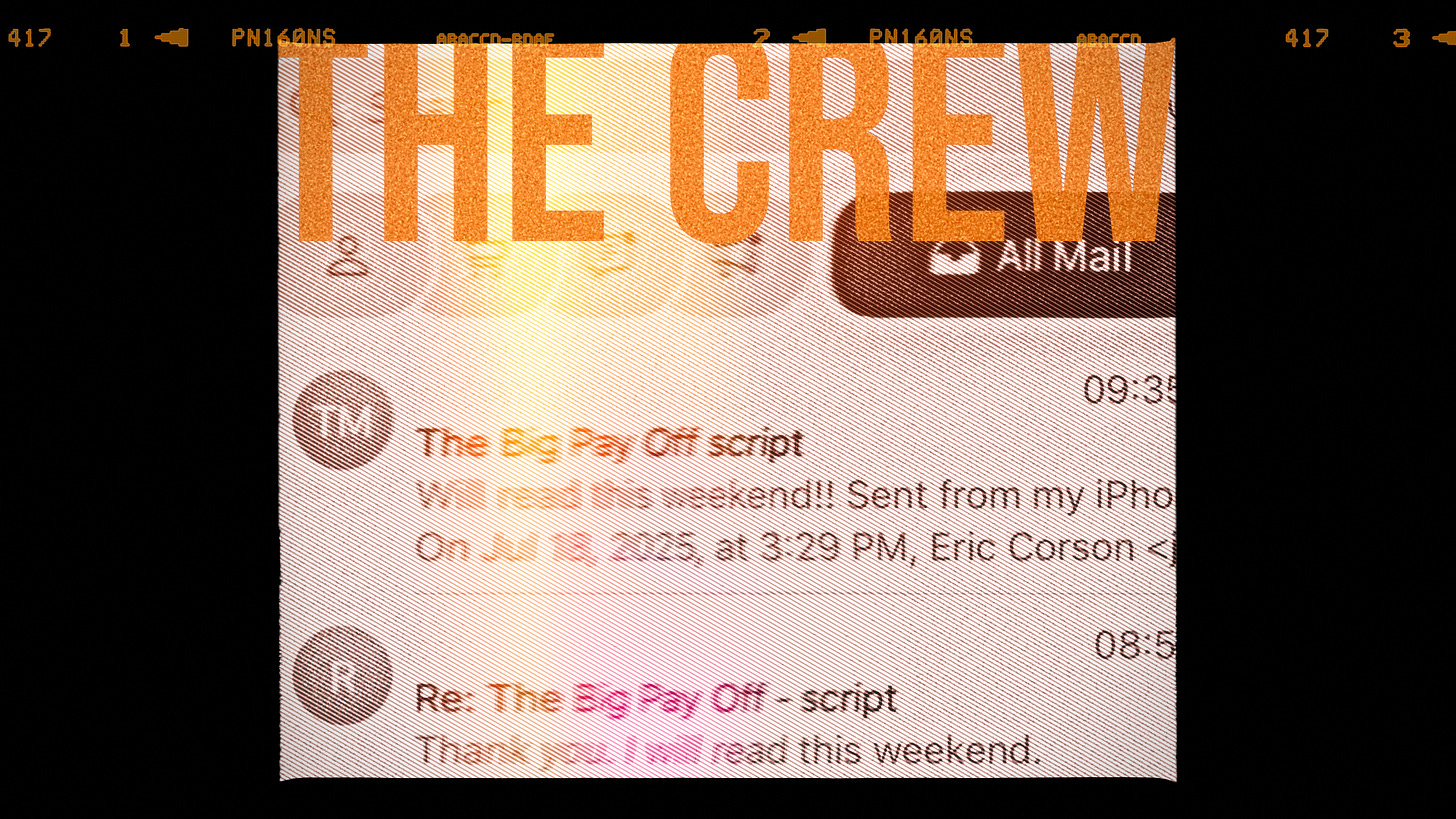In his book Making Movies, Sidney Lumet describes the arrival of different crew and cast members to the first rehearsal of a movie: the PAs who arrange the tables wrong; the actors hiding nervousness which needs appeasing by hugs and kisses from the director; the producer, of which Lumet drily remarks, “usually, he’s the groper.” Then, Lumet writes, “often last to arrive is the writer. He is the last because he knows that at this point he is the target. At this moment, anything wrong can only be his fault, since nothing else has happened yet. So he moves quietly to the coffee table, stuffs his mouth full of Danish so he won’t have to answer any questions, and tries to become as small as possible.”
That’s exactly how I feel at this moment.
Pre-production for my movie The Big Pay Off has not quite started and I just spent the last few weeks doing extensive rewrites on the script. My line producer is groaning at all the changes. Other prospective crew members have the script in their inbox and I’m eagerly awaiting their feedback. Slowly but surely, I need to take off my writer’s cap and put on the director’s hat, a completely new role for me as a first time director I need to get used to. More rewrites will surely be necessary, and I will need to approach them as a director with visual storytelling and emotional integrity in mind.
In the meantime, my crew needs for the shoot are slowly coming into focus. This is a micro budget production (reminder: our budget is $15,000) so I won’t have as many department heads as a normal production. In fact, every person I hire will need to wear multiple hats, myself included. And depending on the specific shoot days, the size of the crew might vary extensively.
At its most expansive, here are the department heads I think would be indispensable on set:
Director (myself)
Producer
DP
Line producer/AD
Production sound mixer
Script supervisor
At its most minimalist, if we’re out in the streets stealing shots, the crew might be as small as just myself and the DP, with me running sound. It’s not an ideal set-up but I have done something similar before and it is doable for smaller scenes that don’t involve elaborate blocking or lots of dialogue.
Some crucial department heads are missing from this list: hair/make-up, production design, etc. Like I mentioned before, everyone will need to wear multiple hats. In my meetings with prospective crew members, I really emphasize this point. This project will demand a lot from everyone, but for a multi-hyphenate this can be an exhilarating creative outlet. (If this is you, please reach out!) My producing partner also has production design experience, and I will lean heavily on her for that aspect. The DP will have to operate the camera most of the time. I will be responsible for wardrobe and props. Location scouting will be a collective effort. We will all be PAs. Hair and make-up is still a question mark at this point, as I would like to avoid having the actors do it themselves. We will see how we handle it. (If you are a hair and/or make-up artist who would like to get involved, please give me a shout!)
Our budget being what it is, I can’t offer any day rates or upfront pay. What I do offer every department head is back-end profit participation. On some days, we might need additional crew day players. Maybe for more elaborate interior lighting, the DP might need a gaffer. Maybe we might need a camera operator to pull off a specific shot. We will need a stunt coordinator on at least one occasion. We might need a dedicated PA to wrangle extras in one scene. We might have to offer a low day rate on those occasions. My goal is not to use our small budget as an excuse to exploit the crew and run everyone to the bone, my goal is to foster a creative environment where people are excited to contribute. And within my modest means, I want whatever compensation I am able to offer to be as fair as possible.
Which brings me to the production sound mixer. As everyone familiar with film production knows, sound is crucial. It is more important than picture. The audience forgives poor picture but not amateurish sound. Sound recordists know this and charge accordingly. I don’t begrudge them this. However, there is no way I will be able to pay a standard day rate to a sound recordist for the length of the shoot. I don’t think I could even afford a discounted day rate. And I don’t know how realistic it is to find a good sound guy or gal who would work for free and hope for profit participation down the line. Maybe a more cost-effective solution would be to buy the necessary equipment out of pocket, then hire a film student focused on sound who might be more amenable to participate in an endeavor like this. We are currently still discussing the best approach.
As it stands right now, our shooting schedule will probably be 3 to 4 days a week over the span of a couple of months. I cannot expect people to drop everything they’re doing and work for free every day for a month without pay. The shoot will have to be broken up in smaller chunks and spread out over time. So far, everyone I’ve talked to about working on the crew also has a day job (myself included) which will mean a Herculean effort to schedule around it. On some days, we will just have to miss certain crew members, which will mean others will have to take on their responsibilities. And certain roles, like DP, are irreplaceable.
In this context, it is my responsibility to foster a working environment that is inviting and rewarding. I have a clear vision of what I want but I welcome creative input. I want people to contribute, to think outside the box, to take full ownership of their role and the movie as a whole. As a PA, I have been on dismal low-budget shoots where the director meandered about unsure of what to do, wasting everyone’s time. Shoots where the only available food was donuts and pizza. Shoots where the producers yelled at us for groaning if the director wanted another camera set-up after we had already busted our asses for 14 hours.
To avoid any of these scenarios, the best thing I can do is offer clarity. Clarity of expectations, responsibilities, what we’re trying to achieve on any given shoot day. The only way to pull off this shoot at our budget level is to come in every day and know exactly what shots we want to get while allowing for new creative ideas and general flexibility if unforeseen circumstances arise. (Which they always do.) I want to be able to gather the crew in the morning and formulate a clear goal for the day so everyone knows what they’re working towards. When we do hit a speed bump, people will be able to problem solve much faster if they have a clear understanding of what the end goal is to begin with. And once we have achieved what we set out to do, everyone can go home. I’m not afraid of the Clint Eastwood method: if I get what I want in the first take, let’s leave it at that and move on! Ideally, we wrap after 8 hours, rarely after 10, never after 12.
As Lumet describes it in his book, “I’m in charge of a community that I need desperately and that needs me just as badly. That’s where the joy lies, in the shared experience.” And further: “A spirit may develop among the crew and cast that adds to the passion of the movie, and this can show up on-screen.” That is, ultimately, my goal. By its very nature, this project is up against the odds. I sometimes lay in bed in the morning convinced I have set myself an impossible task. But if I hire the right people, if I trust them to make the movie better, if we’re all working towards a common purpose, we might just pull it off.






If you don't want to hire a sound guy, then get wireless lavs, and forget a boom.
The only indispensable crew on your set, especially with such a small budget, is you, DP, Gaffer and sound guy. Everyone else is a luxury.